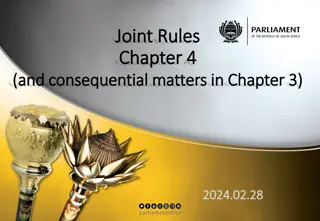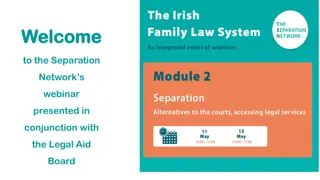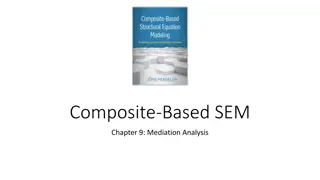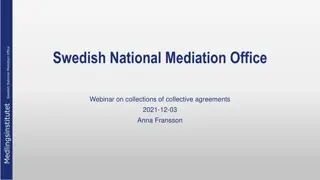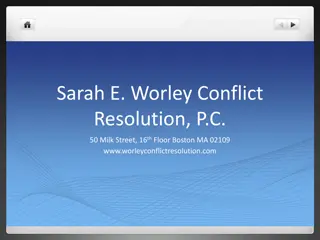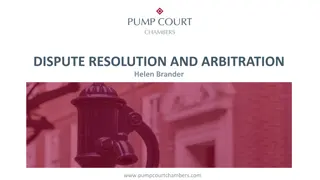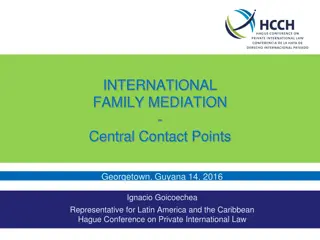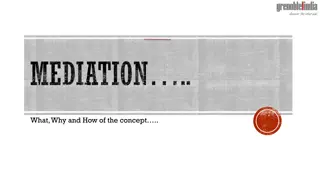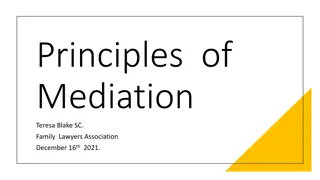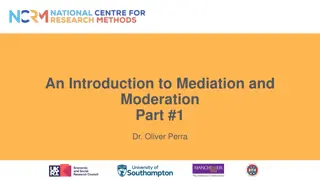
Guide to Mediation in Fraternal Order of Eagles Trials
Learn about the role and responsibilities of a mediator in Fraternal Order of Eagles trials. Find out who can act as a mediator, who cannot, and the steps involved in the mediation process before a trial. Discover the importance of neutrality, contact with parties, and encouraging agreement.
Download Presentation

Please find below an Image/Link to download the presentation.
The content on the website is provided AS IS for your information and personal use only. It may not be sold, licensed, or shared on other websites without obtaining consent from the author. If you encounter any issues during the download, it is possible that the publisher has removed the file from their server.
You are allowed to download the files provided on this website for personal or commercial use, subject to the condition that they are used lawfully. All files are the property of their respective owners.
The content on the website is provided AS IS for your information and personal use only. It may not be sold, licensed, or shared on other websites without obtaining consent from the author.
E N D
Presentation Transcript
The Worthy President, upon filing of the Complaint, shall appoint one (1) member in good standing in the Fraternal Order of Eagles, independent of the Trial Committee, who is designated as the Mediator who may or may not be a member of the Aerie and who shall forthwith attempt to settle matters between the parties prior to the trial date. Attempted mediation is a mandatory part of the trial process. Section 63.3
Who may act as mediator? A member in good standing of any Aerie or Auxiliary (See Section 63.3) The Mediator should have as little knowledge regarding the alleged offense as possible in order to remain neutral.
Who may NOT act as mediator? The Worthy President Members of the Trial Committee The Prosecutor The Defense Counsel The Secretary (or recorder of the trial) Any person who may be called as a witness at the trial The mediator cannot participate in the trial in any manner
Role of the Mediator The Mediator should make every effort to get the parties to resolve their conflict prior to going to trial.
Responsibility of the Mediator Remain neutral. Make contact with both parties to arrange the date, time, and place in which mediation will take place. Encourage both parties to work together to reach an agreement. Explain to both parties that their agreement is not bound to the same restrictions as the penalties in Section 63.7. Make as many attempts as necessary to come to settlement terms. Complete the Mediation Settlement Statement indicating either the settlement terms or that the parties wish to proceed to trial, and submit it to the Trial Committee Chairman.
Responsibility of the Mediator Remain neutral. The mediator is a member in good standing who may or may not be a member of the Aerie and is selected by the Worthy President, or the presiding Officer, on a case by case basis The mediator should have had as little contact with the problem as possible
Responsibility of the Mediator Make contact with both parties to arrange the date, time, and place in which mediation will take place. The mediator should make every effort to get the Accuser and the Accused to meet together If the parties are unwilling to meet together, the mediator may speak to each party separately The mediator may use any method of communication necessary, including, but not limited to, email, text, personal phone conversations, and conference calls
Responsibility of the Mediator Encourage both parties to work together to reach an agreement. The mediator should make every effort to encourage a conciliatory atmosphere The mediator may make a suggested settlement if the parties are unable to resolve the matter Mediation is not to be viewed as, or mistaken for, the trial procedure, or determining guilt or innocence
Responsibility of the Mediator Explain to both parties that their agreement is not bound to the same restrictions as the penalties in Section 63.7. The terms of the mediation agreement are determined by the Accuser and the Accused A mediation agreement can include things such as a verbal or written apology, monetary reimbursement, transfer of membership, etc. Voluntary expulsion is a valid mediation agreement
Responsibility of the Mediator Make as many attempts as necessary to come to settlement terms. Mediation may continue up until the start of the trial Encourage the parties to make counter offers until an agreement can be reached
Responsibility of the Mediator Complete the Mediation Settlement Statement indicating either the settlement terms or that the parties wish to proceed to trial, and submit it to the Trial Committee Chairman. The Mediation Settlement Statement must be completed by the mediator and submitted to the Trial Committee Chairman prior to trial If the Accuser and/or Accused refuse to sign the completed statement, the mediator should note that on the form Any condition of mediation must be implemented within 15 days of the date of the agreement
Role of the Accuser and Accused The Accuser and the Accused should make every effort to resolve their conflict prior to going to trial.
Responsibility of the Accuser/Accused Make a good faith effort to participate in mediation. Remain respectful of the other party.
Responsibility of the Accuser/Accused Make a good faith effort to participate in mediation. Listen to the other party with an open mind while he states his position State your position respectfully Be prepared to compromise for the good of the Aerie
Responsibility of the Accuser/Accused Remain respectful of the other party. Remember your obligation Personal remarks and personality conflicts are counterproductive to an effective mediation
After Mediation What happens next?
After successful mediation If mediation is successful and a Settlement Statement is signed by both parties, the filing fee shall be returned to the Accuser (See Section 63.1 (b)) Once the Mediation Settlement Statement is signed by the parties approving a settlement in a case, it is final and binding and conclusively settles the matter A copy of the signed Statement is immediately given to the Trial Committee Chairman to inform him that a settlement was reached and the trial is canceled Any condition of the Mediation Settlement Statement must be implemented within fifteen (15) days of the date of the agreement Failure to fulfil the terms and conditions agreed upon constitutes grounds for filing new charges of conduct unbecoming an Eagle; this also restarts the original Complaint, and the ninety (90) day timeline for offenses is waived The Worthy President is responsible for enforcing the terms of mediation
After failed mediation If the parties cannot compromise their differences and reach an agreement, the mediator completes the Mediation Settlement Statement by checking the box stating the parties wish to continue to trial as scheduled If either party refuses to sign the Mediation Settlement Statement, or signs stating they do not want to mediate, this is viewed as a completed mediation and the matter proceeds to trial; as a courtesy, the mediator should contact the other party to inform him/her that the first party has refused mediation The mediator signs and dates the Statement and sees that the Trial Committee Chairman immediately receives a copy (See Section 63.3) Mediation documents shall not be considered as evidence for trial purposes or during an appeal (See Section 63.3)
Mediation Trials can be costly to an Aerie, both financially and in divisiveness of the members. While sometimes a trial is necessary, most issues are able to be resolved by an effective mediator when the parties are willing to work together.
Jolie Stauffer Secretary of the Grand Tribunal grandtribunal@foe.com 614-883-2175 For further information regarding mediation, please refer to Appendix A at the back of the Statutes

